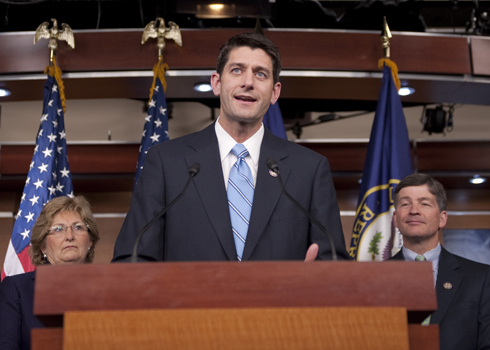House Republicans recoiled Wednesday evening from President Obama’s speech on America’s budget woes. After spending most of the week pre-empting the address, and rejecting its expected calls for tax increases on wealthy Americans, Republicans endured a broad and severe critique of their vision for the country.
Their responses thus edged beyond substance into the realm of personal grievance. Indeed, they implied that the speech may have poisoned the well so much that working together where common ground exists might now be impossible.
“I missed lunch for this?” complained Rep. Jeb Hensarling (R-TX), chair of the House GOP conference, at a Capitol press conference shortly after the address.
House Budget Committee Chairman Paul Ryan (R-WI) attacked the partisan bent of the speech, then characterized it as “a political broadside from our campaigner in chief.”
“We have very different positions on health care,” Ryan noted. “What we were hoping for was possibly getting some bipartisan agreement on another entitlement program that’s going insolvent, like Social Security.”
After the press conference he suggested Social Security might not be doable anymore.
“I was hoping Social Security and some budget controls, and I didn’t even hear that,” he said. “I was naively optimistic that the President was going to give us a sincere olive branch.”
“Raising taxes is not what we need right now two days before tax day,” said House Majority Leader Eric Cantor (R-VA).
The bitterness of the attacks presages brutal budget negotiations in coming weeks, and complicates the debt limit fight. Republicans are demanding enforceable spending caps and perhaps other fiscal flesh in exchange for preventing the country from defaulting on its obligations and sending the economy into a tailspin. That’s easier said than done when the two parties are divided both ideologically and temperamentally.
House Republicans are expected to vote overwhelmingly this week in support of their own budget — a long-term plan that privatizes Medicare, dramatically cuts Medicaid, and lowers taxes on wealthy Americans. Obama, by contrast, has offered a framework that doesn’t have universal buy-in from his party.
If he turned it into legislation and demanded a vote on it tomorrow, “he’d get very few — he’d get probably no Republican votes, and he’d lose a bunch of Democratic votes,” admitted Rep. Rob Andrews (D-NJ). “Because if you look at it in the abstract — it’s this or nothing — people always choose nothing. I don’t think that’s what the choice is going to wind up being by the end of this process.”
These two visions represent opening bids in negotiations that will influence the outcome of the debt ceiling fight, and could easily drag well past the summer.
“I think there is basis here for a deal where something very substantial happens by the end of June,” Andrews said. “These kind of big deals happen when people do things that discomfort their bases.”
Even if it means Republicans would have to hold their noses and support tax increases? Andrews is optimistic.
“Republicans drew a line in the sand that they wouldn’t fund Planned Parenthood — they’re going to tomorrow. They drew a line in the sand they wouldn’t fund what they call ‘Obamacare’ — they’re going to tomorrow. They drew a line in the sand that said they wouldn’t let these riders go on the environment — they’re going to tomorrow.”










